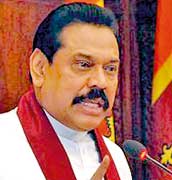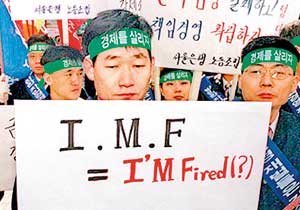Speaking to central bank governors of Southeast Asia President Mahinda Rajapaksa underlined the importance of reforming the international financial institutions to better serve the world community which they had undertaken to do.
This is an issue that has occupied the minds of governments, particularly from the developing world, economists and financial experts especially since the Asian financial crisis was upon us in the butt-end years of the 20th century.
 |
Rajapaksa for reforming
international financial institutions |
It is also a subject high on the agenda of ESCAP, the largest regional arm of the United Nations. This is so not only because of the lessons learnt from the Asian crisis but also because the idea of a regional monetary fund that was mooted in the immediate aftermath of that crisis has returned to centre-stage following the financial blow out in the US and the Euro zone that began two years or more ago.
It is perhaps appropriate that I write this from Bangkok for it was Thailand's financial profligacy in the 1990s that sparked off the crisis in the first place. The economic contagion spread far as the spark started in Thailand set alight economies in the region, save perhaps in Malaysia where the Mahathir government reacted with measures that flew in the face of advice offered by international financial institutions and monetary experts.
Despite the Cassandra-like prognostications of orthodox economists, the Mahathir formula of capital controls largely isolated the Malaysian economy from the worst consequences of that fin-de-siècle crisis. Some might say it was not capital controls that saved Malaysia. But there is nothing to say they did not.
The boom in some Asian economies ended in bust. I was then in Hong Kong where the property bubble that had led the territory's economic growth burst and initially sent it into a tail spin almost immediately after the former British colony returned to Chinese sovereignty.
That of course was sufficient for those who had been angered by the changing of the guard, as it were, in Hong Kong and found occasion to read the tea leaves and call it a bad omen for the people of the new special administrative region as Hong Kong had now been designated.
President Rajapaksa told the governors that it was "clear that if we are to safeguard the world economy in the future, we would need to build a new financial order and a model that will better equip us to face crises of this nature."
Among the many causes that President Rajapaksa identified as compounding the global economic crisis that began more than two years ago in the US were the "blatant application of double standards; the obvious policy contradictions and inconsistencies; the stubbornness of large economies to face realities; the unfortunate attempts to politicize multilateral financial organizations and the lethargy in handling urgently needed financial bail-outs."
Leading international economists such a Joseph Stiglitz, a Nobel Prize laureate, speaking at the ESCAP Bangkok some months ago mentioned some of these shortcomings in financial institutions such as the IMF.
It might be remembered that when Sri Lanka was discussing with the IMF a $ 2.5 billion loan in 2009, US and UK opposed it on what they claimed were "humanitarian" grounds but others saw as largely political.. Sri Lanka had just won the war against the LTTE despite western pressure to stop the military offensive. It angered several western governments as their 'advice' was rejected and there was a concerted effort to sabotage the loan.
Fortunately the IMF did not succumb to such political pressure which would have violated the IMF mandate which directs the Fund to decide such issues on essentially economic grounds and not on political criteria.
 |
| Thai youth protesting against IMF |
Such unprecedented actions come as no surprise. From the very outset the UK and US had violated what were the IMF's obligations. In 1949 Britain undertook a unilateral devaluation in order to gain competitive advantage and write-down its wartime debt without facing punishment.
The US ignored the limit set by the gold-exchange standard on its deficits and flooded the world economy with dollars that eventually made it impossible to maintain gold convertibility.
The Asian region that is leading the world's economic recovery at a time when the west is lagging seriously behind, cannot rely on the G-7 countries to undertake the necessary reforms of the international financial institutions that would not only eliminate their present incapacity or reluctance to fulfil the mandated obligations but also introduce a more balanced governance in these systems.
Institutions like the IMF are controlled by the western nations that dominate them with their voting power. While the developing demand a reorientation of the voting structure and a greater say in the manner in which the Fund is managed, the west is dragging its feet on any meaningful reform.
Since Asia is leading the charge in global economic recovery the region should have a greater voice in the determination of policy on global issues. At the 66th Commission session of ESCAP held in South Korea last year Asian leaders proposed common economic and financial measures that will ensure Asia's early rebound from the global crisis and foster broader economic growth across the Asia- Pacific region.
While that is naturally important to ESCAP which has among its core aims the elimination of poverty and the amelioration of the living standards of its people, Asia cannot influence global policy making unless and until it speaks in one voice.
In many of the conversations I have had with ESCAP's Executive Secretary Noeleen Heyzer, an Undersecretary-General of the UN, she has underlined the importance not only of regional co-operation to promote development but equally (if not more importantly) the need for Asia to speak with a single voice.
At an ESCAP Retreat in the southern coastal town of Huahin last month Noeleen Heyzer reiterated her driving desire to see the Asian region develop a stronger and coordinated voice to shape global processes.
"We must strengthen the voice of the region and evolve regional positions to influence global policy," she said.
That makes eminent sense. If Asia is driving the engine of global growth as Ms Heyzer says, then it should surely have a greater voice in determining policy on issues that affect the region too.
At the same time it cannot be left to the current major shareholders in the international financial institutions to rearrange the architecture. They will not want their grip on such institutions slipping away from them even though their economic dominance is diminishing in the face of rising new economic giants in Asia.
It is all the more reason why Asia which has also not escaped the deleterious consequences of the global financial meltdown set in train by the west must pursue more vigorously its efforts to establish its own regional monetary institution.
As Noeleen Heyzer once reminded me Asia has $4 trillion or more in reserves. At the same time small and poor countries in the region have only limited and costly access to capital markets for their development finance needs.
If Asia's reserves are available to the needy nations in Asia and to finance the development so necessary to achieve the Millennium Development Goals many of which will probably remain unfulfilled by the target date four years from now, ESCAP's hopes of reducing poverty could be hastened.
(The writer is a serving diplomat at Sri Lanka's mission in Bangkok) |



